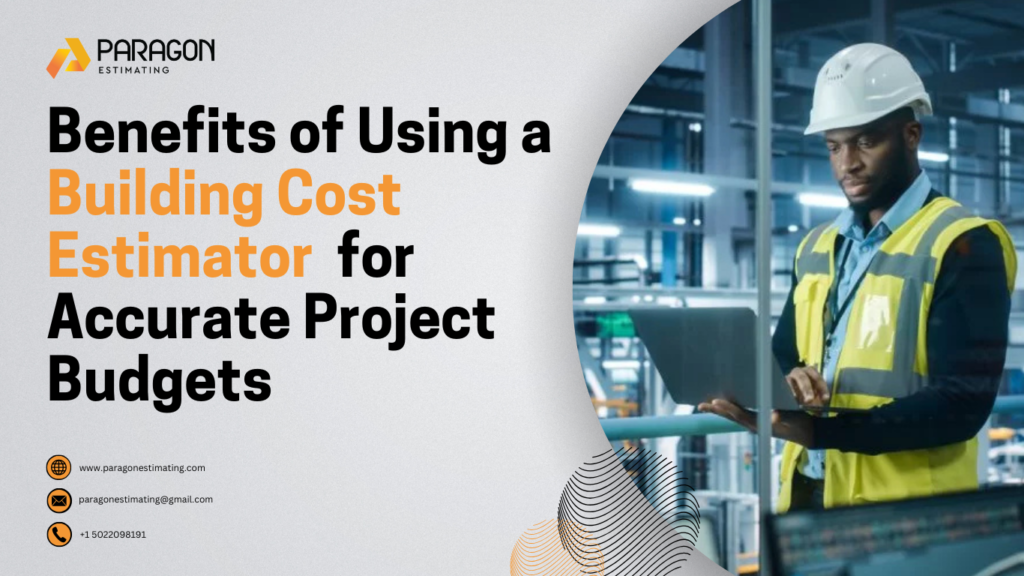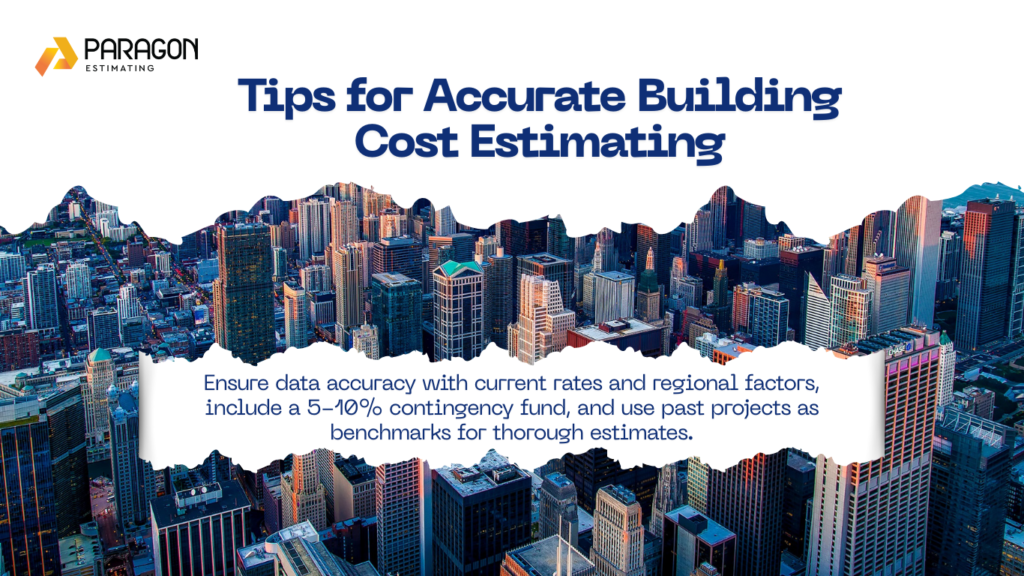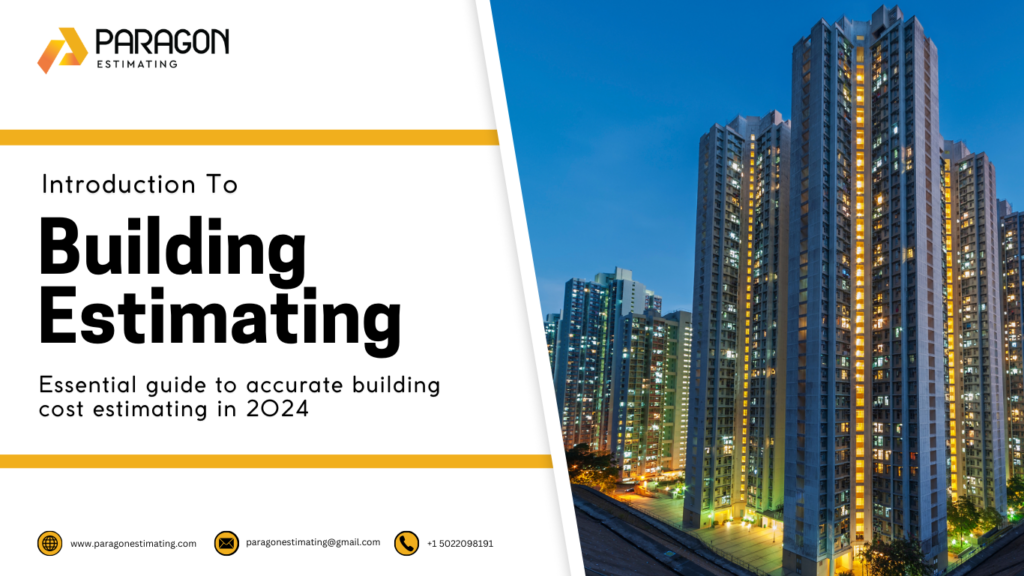Precise Building Estimating Services for Every Project
Paragon Estimating offers exact and reliable building estimating services to give you the clarity and trust required for your building projects. Our knowledgeable staff can rapidly and precisely predict the expenses for your residential, contractor, or developer building project. Each estimate we deliver is prepared using industry-trusted software and reviewed for accuracy to help contractors win bids and stay within budget. Paragon Estimating is your trusted partner whether you’re an architect looking to validate your design budget, a builder needing quick turnarounds, or a developer seeking long-term estimation support.
What is a Building Cost Estimate?
Building cost estimating estimates the expenses required to complete a building project. It covers supplies, labor, tools, licenses, overheads, and backup plans. It guides builders, contractors, and property developers in budget planning, loan securing, and project keeping within budgetary limits.
Why Should One Use a Reliable Building Cost Estimator?
A building cost estimator offers a construction project a clear financial road map. Project budgets may become unmanageable without a precise estimate, leading to delays and economic losses. Every cost element has to be exactly computed to enable stakeholders to make wise decisions and maintain the project’s direction.
Types of Building Cost Estimators
Different building cost estimators help determine project expenses by analyzing materials, labor, and design specifications to ensure accurate budgeting.
Metal Building Cost Estimator
Metal buildings have extensive commercial and industrial uses. A cost estimator guides the cost of steel construction, including materials, labor, and other features such as insulation.
Steel Building Cost Estimator
Cost-effective and robust steel constructions: To ensure an accurate budget plan, a steel building cost calculator determines the cost depending on size, design, and structural steel estimator needs. It guides builders and investors toward reasonably priced decisions for long-term structural integrity.
Pole Building Cost Estimator
Pole buildings, often used for agricultural and storage purposes, require a specialized estimator for pole building costs to evaluate foundation, framing, and roofing costs. Accurate estimates ensure affordability while maintaining strength and functionality.
Building Construction Cost Estimating Software
Advanced building construction cost estimating software simplifies the estimation process, reducing human errors and providing real-time cost adjustments based on market rates. These tools enhance efficiency, allowing for better project planning and financial management.
Estimate the housebuilding Cost
Estimating the total cost of construction is essential for residential projects. Our experts estimate home building costs based on materials, design, and labor requirements. A precise estimate prevents budget overruns and ensures smooth project execution.
How Our Building Cost Estimating Process Works
Our building cost estimating process follows a structured approach, ensuring accurate cost calculations through detailed data collection, analysis, and precise budgeting.
Initial Consultation
We initially understand the aspects of your project. Whether you’re constructing a framing cost, a commercial property, or a home, we tailor our products to meet your requirements. Our staff makes sure your vision is accounted for in all its elements to offer a realistic price.
Data Collection
Our experts gather all relevant details, such as building materials, project scale, and location factors. This step allows us to account for market fluctuations, labor costs, and site-specific challenges.
Detailed Analysis
We analyze the data and calculate the precise cost breakdown using the latest building construction cost estimating software. Our advanced tools help eliminate errors and provide real-time cost adjustments.
Final Estimate
We present you with a detailed report that outlines all costs involved in your project. This transparent breakdown helps you plan effectively and make informed financial decisions before construction begins.

Why Paragon Estimating Is the Best Choice for Building Cost Estimating
Paragon Estimating is particularly notable for its accuracy, efficiency, and industry knowledge in building estimating. We use cutting-edge techniques and real-time data to produce highly precise cost breakdowns covering materials, labor, and project expenses. With years of expertise, we provide tailored solutions for home, business, and industrial projects and grasp the complexity of building estimating. Our innovative estimation system guarantees accuracy, enabling customers to stop expensive delays and budget overruns. Backed by an experienced team of estimators, we bring precision, speed, and industry expertise to every building estimate we deliver. Furthermore, our committed support staff offers professional advice throughout the building cost estimating process, simplifying and economizing building planning.
How Paragon Estimating Can Help
At Paragon Estimating, we understand the complexities of commercial cost estimating. With years of experience and cutting-edge technology, we provide tailored, accurate estimates to ensure your project stays on track. Whether you’re working on a small office building or a large commercial complex, we have the expertise to meet your needs.

Final Thoughts
Accurate building estimations are essential for budget-conscious construction estimating projects that ensure financial success. Whether your project is industrial estimating, commercial estimating, or residential estimating, a well-prepared estimate guarantees seamless execution and helps prevent expensive surprises. Paragon Estimating specializes in providing precise and timely cost assessments customized to meet your project’s unique requirements. Get in touch with us right now for professional building cost projections. Our staff is ready to offer accurate predictions that enable you to budget and control building expenses properly.
FAQs
What is Building estimating?
Building cost estimating is the process of predicting the total cost of a construction project by evaluating materials, labor, equipment, overheads, and contingencies. It’s essential for managing a project’s budget, timeline, and overall feasibility.
Why is accurate cost estimation important?
Accurate estimates help control the project budget, manage risks, set realistic schedules, and gain investor confidence. They also reduce the chances of cost overruns, delays, and unforeseen expenses.
What are the types of building cost estimates?
Accurate estimates help control the project budget, manage risks, set realistic schedules, and gain investor confidence. They also reduce the chances of cost overruns, delays, and unforeseen expenses.
How can I improve the accuracy of my cost estimates?
To improve accuracy, use up-to-date and reliable data, factor in contingencies, review past projects, and ensure clear communication with contractors and clients throughout the process.
Who performs building estimating?
Typically, a construction estimator, quantity surveyor, or project manager performs the building estimate. Larger firms may use dedicated estimating departments or software tools.



